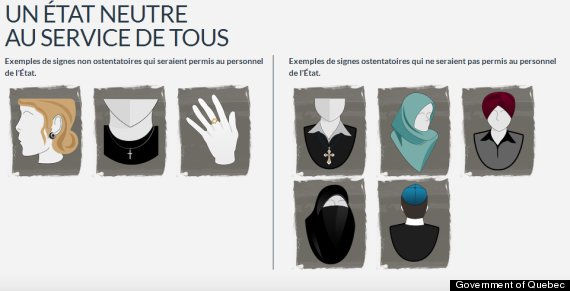Reasonable Accommodation Is a Two-Way Street
- John Stackhouse

- Apr 4, 2019
- 3 min read
Updated: Jun 24, 2022
There’s a lot to dislike in the Quebecois government’s recent bill that would outlaw the wearing of religious symbols by public servants—presumably including everyone from police officers to teachers to hospital clerks. But the government isn’t entirely wrong in its concern about religious wear in public.
I’m on record as opposing this government, or any Canadian government, placing restrictions on head coverings except in the extreme and easily remedied cases of identification. (I’ve put those arguments elsewhere on this weblog and in national media.)

What is particularly odious about this recent legislation is that the Quebecois government is mandating symbolism that says, “Religion should be kept out of public life” while insisting that it is intending merely at symbolism that says, “The state is religiously neutral.”
If the latter were really the government’s concern, however, then letting people wear any religiously-themed clothing or jewelry (that, of course, didn’t interfere with their work—common sense has to apply here) would be a fine way of demonstrating the state’s neutrality. “We welcome into public service Jews wearing kippahs, or Sikhs wearing turbans, or Christians wearing crosses, or Wiccans wearing pentagrams, since all such people are indeed our neighbours and our fellow citizens.” Period.
Requiring people to shed their religious symbols—which amounts to refusing to hire any observant members of some religions, since such people have the integrity not to compromise with an overweening state—serves a different purpose. It restricts the “right” sort of Quebecer to one who doesn’t belong to such groups or one who is indifferent to his group’s customs. The law won’t, in fact, purge the public service of religious believers—just of those who are serious about religions the Quebec government would prefer to stay out of sight, and certainly out of public life.
The proposed legislation is therefore the very definition of religious discrimination. It imposes a rule that hurts only some religious people, not others, rather than “reasonably accommodating” their religious preferences. And for what? To cater to the preferences of the Quebecers who dislike or fear members of such religions? To squeeze certain religious people out of public life? Those are hardly commendable motives.
Yet not everything about such legislation is wrong. “Reasonable accommodation”—the lapidary principle at the heart of the Bouchard-Taylor Report—works both ways. The increasing allowance across the country for Sikhs to wear turbans instead of motorcycle helmets is a recent example of a serious mistake on the other hand.
No Sikh religious law is broken by wearing a helmet: the principle of “kangha” is merely to control the hair as an act of submission to God. Certain Sikhs have pressed for this allowance merely because it’s inconvenient to unwrap a turban and put on a helmet.
As a society, however, we have decided that the cost to everyone involved is too high to let people ride motorcycles without helmets: the financial cost, the cost of hospital beds in overcrowded facilities, the cost of staff time in those overcrowded facilities, the possible welfare costs of supporting those bereft of a breadwinner, and so on. So if you want to live and ride in Canada—as I do—you should wear a helmet.
Such issues each determine whether we are going to live respectfully with each other’s differences or perpetuate instead the ugly extremes: the self-centred colonizing of parts of Canada by foreign populations while nativists strike back to insist that only their ways are authentically Canadian.
All over the western world these issues are being controverted, with violent results and even more alarming prospects. Here’s hoping we Canadians, with our history of mutual respect, forbearance, and accommodation, can do better than we’ve been doing of late.


